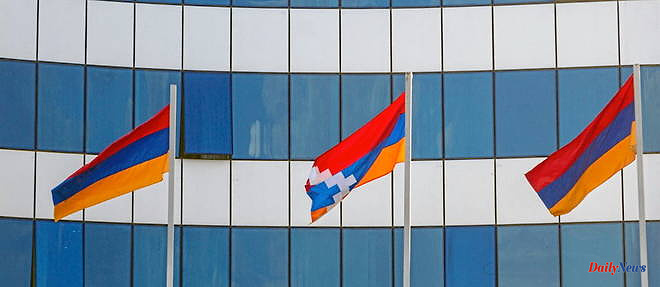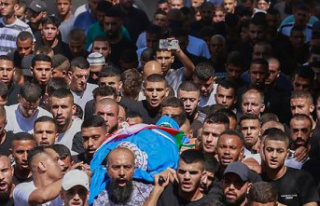A first group of refugees fleeing Nagorno-Karabakh entered Armenia this Sunday, which, for its part, implicitly criticized Russia for its lack of support in the wake of the victory of the Azerbaijani army against the inhabitants of this territory mostly populated by Armenians. “The external security systems in which Armenia is involved have proven ineffective in protecting its security and interests,” insisted Armenian Prime Minister Nikol Pashinian in a televised speech.
An allusion to the long-standing relations that this Caucasian country maintains with Moscow, inherited from the time when it was part, like neighboring Azerbaijan, of the USSR. Because Armenia is still a member of the Collective Security Treaty Organization (CSTO), a military alliance headed by Russia.
New sign of the strong international impact that this new crisis continues to have: Turkish President Recep Tayyip Erdogan will meet, Monday, September 25, his Azerbaijani counterpart, Ilham Aliev, in the Azerbaijani enclave of Nakhchivan, nestled between Armenia and the 'Iran. And a long-planned meeting on October 5, in Spain, between Ilham Aliev and Nikol Pashinian, is being maintained, according to the Armenian authorities. It will take place in Granada with the participation of the French Head of State, Emmanuel Macron, the German Chancellor, Olaf Scholz, and the President of the European Council, Charles Michel.
In the afternoon, a few dozen residents of Nagorno-Karabakh, including women, children and the elderly, arrived at the reception center set up by the Armenian government in Kornidzor, on the Armenian-Armenian border. Azerbaijani.
Not far away, in the Armenian town of Goris, other facilities, equipped with first aid kits, megaphones and dozens of computers, were also seen by AFP.
The Nagorno-Karabakh authorities had shortly announced that civilians left without housing due to the latest violence would be transferred to Armenia with the help of Russian peacekeepers present there since the previous war, in 2020.
Azerbaijan, for its part, has undertaken to allow rebels who surrender their weapons to go to Armenia.
And it is through the same Kornidzor border crossing that 23 ambulances transporting “seriously injured citizens” accompanied by doctors and Red Cross employees must pass, the Armenian Ministry of Health said.
A man interviewed by AFP in Kornidzor said he had been part of the "resistance" until Azerbaijan's assault forced the rebels to capitulate on Wednesday. “Our families were in the shelters. We were in the army but yesterday we had to lay down our rifles. So we left,” said the villager in his thirties who was waiting with others to be registered at the reception center.
Many fear in this regard that the local population will flee en masse, at a time when Azerbaijani forces tighten their grip.
Because, in addition to the anxiety that reigns among the approximately 120,000 inhabitants of Nagorno-Karabakh, the humanitarian situation there remains very tense. Surrounded by Azerbaijani troops, its “capital”, Stepanakert, is deprived of electricity and fuel and its population lacks food and medicine, according to an AFP correspondent.
On Saturday, as a first aid convoy from the International Committee of the Red Cross entered Nagorno-Karabakh, at the UN podium in New York (United States), Armenia, reiterating its accusations of "ethnic cleansing", called for the "immediate" dispatch of a United Nations mission there.
Tension is also high at the Kornidzor border post, where dozens of angry Armenians are seeking news of their loved ones, AFP noted. Wild rumors spread through the crowd and one man even pulled out a knife.
“My son was in the army in Artsakh [Nagorny-Karabakh]. He’s alive but I’m worried about him,” said a 43-year-old man. He says he “hopes that armed groups will cross the border.” “If they do it, I will go with them to save my son” from this mountainous enclave attached in 1921 by Soviet power to Azerbaijan and which was, in the past, the scene of two wars: one from 1988 to 1994 (30,000 deaths) and the other in the fall of 2020 (6,500 deaths).
“I support” the ongoing operation by Baku to regain control of this secessionist territory, “our beautiful land has been liberated”, exclaims to an AFP journalist Famil Zalov, a farmer in his fifties of years. Asked about future cohabitation with the Armenians, he immediately blurted out: “I cannot accept this personally, because my 18-year-old brother was martyred in 1993. No, I cannot accept it. The president [Ilham Aliev] showed them the way. The hallway is open. They can use it and walk away,” he continues. “I’m proud that my brother got his revenge,” he concluded.
Minaya Valieva was born in 1951. “If you dig the soil of these mountains […] you will find things – our grandfather's woolen jacket, our grandmother's combs – but you will not find anything that belongs to the Armenians or the Russians,” she assures.
But the conflict is not unanimous in Azerbaijan. “This week, five people were arrested in Azerbaijan for anti-war messages and four others for political activism,” Azerbaijani human rights activist Jala Bayramova reported on X (formerly Twitter) on Sunday. “All of them received sentences ranging from thirty days of imprisonment to two months of preventive detention,” she stressed.












